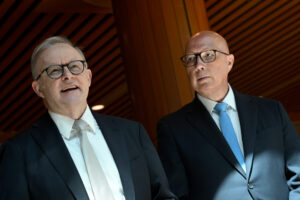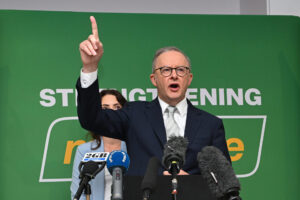There has never been a worse time to be a centre-right economist. From the IMF to the World Bank, Australia’s RBA, the US Treasury and now our very own Josh Frydenberg have all abandoned talk of budget and government restraint. For 40 years, the anti-debt and deficit rhetoric held much of centre-right economic orthodoxy together.
Of course, the pandemic recession is the excuse for the new Keynesianism but the trends toward progressive economic orthodoxy were there well before the virus struck, as policy-makers grappled with the economic consequences of low wage growth and inequality. The recovery is now in full swing and employment levels are near pre-pandemic levels, but the definition of full employment is being rounded down so the new, big-spending, “forget the deficit” approach will last long after the pandemic.
All this is a welcome relief as politics and economics combine to produce better policy outcomes, more jobs and an economy that should genuinely serve more people better.
However, what is missing from the Australian debate so far is tax. While many progressives are rightly crowing about the collapse of the right’s debt and deficit dogma, there has been far less success in shifting thinking around tax.
The biggest income tax cuts in the nation’s history have been baked into future budgets. $300 billion worth of tax cuts have been legislated with the last phase of the program – the stage 3 income tax cuts – soon to deliver an unprecedented windfall to wealthier Australians. It is a radical flattening of the progressive income tax system.
And reports are the budget will deliver further tax cuts. While economic arguments can be made for a fiscal stimulus tax cut, the danger lies in the long term. Without a secure revenue base the role of government will diminish.
It would be naive to assume governments who have abandoned demonising debt will not return to form in the years to come. The current spending drive risks being temporary while legislated tax cuts are, by definition, permanent.
One possible reason for this silence is the emergence of modern monetary theory.
The net result is an enfeebled state with reduced capacity to solve the next round of challenges society will inevitably face. Adapting to the increase in floods, droughts and fires from climate change is likely to be just one of the new calls on governments of the future.
The global race to the bottom on tax has been called out by US Secretary of the Treasury Janet Yellen. Joe Biden had committed to increasing, not cutting, the corporate tax rate, as has the UK. Yet this part – the tax part – of the new economic order has not yet caught up with politics in Australia.
One possible reason for this silence is the emergence of modern monetary theory (MMT), which rightly emphasises that governments that print their own currency cannot possibly go bankrupt. But managing the economy requires far more than avoiding bankruptcy, and the fact that governments cannot run out of currency does not mean nations can avoid hard debates about the optimal size of the state.
Tax is the price we pay to live in a civilised society. While even Josh Frydenberg now admits there is no need to balance the amount of money spent by government each year with the amount collected in tax, in the long run the more tax a government collects, the more services the public sector can provide to its citizens.
If Australia wants the high-quality social, environmental and economic services like those enjoyed in Nordic countries, we cannot have the kind of tax system that high-income earners in countries such as Singapore enjoy.
In short, countries that collect more in tax make more room in their economies for improved public health, education and transport systems.
For decades, we have been sold on a diet that preached budget surpluses would make us rich and the smaller the public sector was, the better off we would all be. But whether the crisis is bushfires, COVID-19, aged care or mass unemployment, we have seen in recent years that everyone agrees the best solution to our most pressing problems is an expanded public sector.
New research by the Australia Institute shows Australian governments spend around $10 billion per year subsidising the use and extraction of fossil fuels. The Prime Minister says we should rely on “technology not taxes” to drive the response to climate change. The fact is the government has been tipping billions into helping the fossil fuel industry compete with renewable energy, battery storage and electric cars.
But regardless of whether Australians want to help the victims of climate change, or help those who cause it, the more tax we collect the more support government will be able to offer.
While the numbers do not have to add up in any given year, in the long run the only way to have a much stronger public sector is to collect more tax revenue. While abandoning the obsession with delivering budget surpluses is the first step on the long road to a complete philosophical U-turn, it is the next step that is the most important.
A government that admits it is responsible for COVID vaccines, aged care, disability care, childcare, infrastructure and rebuilding sovereign manufacturing capability has to admit it is responsible for collecting a lot more revenue.
Between the Lines Newsletter
The biggest stories and the best analysis from the team at the Australia Institute, delivered to your inbox every fortnight.
You might also like
5 ways and 63 billion reasons to improve Australia’s tax system
With a federal election just around the corner, new analysis from The Australia Institute reveals 63 billion reasons why our next Parliament should improve the nation’s tax system.
Leaders’ debates can be useful, but no debate is better than a scrappy one
Robust debate is better than mealy-mouthed bipartisanship. Televised leaders’ debates can be a good thing if they illustrate the choices facing voters.
Business groups want the government to overhaul the tax system? Excellent – we have some ideas.
The landslide win by the ALP has seen business groups come out demanding the government listen to their demands despite having provided them no support, and plenty of opposition, over the past 3 years.



